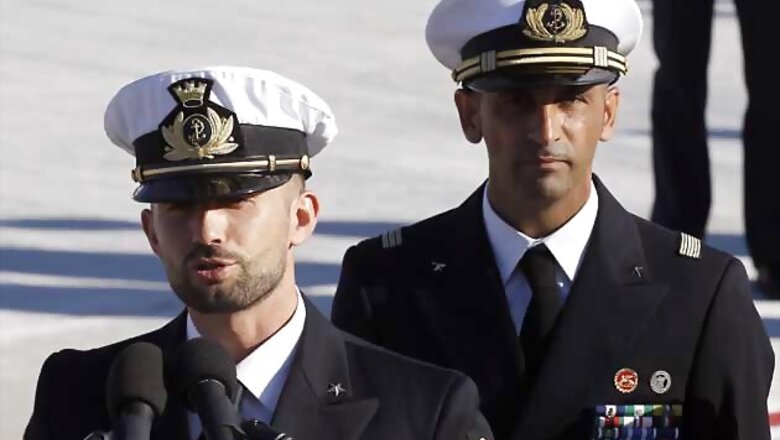
views
New Delhi: The controversy surrounding two Italian marines facing murder charges in India has triggered tensions between both the nations and now a journalist from Italy has penned a book to soothe frayed nerves back home by sharing India's side of the story with his countrymen. Titled "I due maro: Tutto quello che non vi hanno detto (The Two Marines: What They Haven't Told You), the upcoming book narrates the yearlong saga of the marines - Massimiliano Latorre and Salvatore Girone - who allegedly shot dead two Indian fishermen off the Kerala coast in February last year, sparking diplomatic tensions between India and Italy.
Written entirely in Italian, the tome basically tries to explain what was and is the Indian version of the incident because in "Italy nobody took time and patience to try to understand what was going on here", says Matteo Miavaldi, the author. Rome wants to try the marines in Italy claiming the incident took place in international waters. However, New Delhi says it has the right to try the Italian naval personnel as the victims were Indian on board an Indian fishing boat.
The marines, deployed on board an Italian oil tanker to guard it, say they mistook the fishermen for pirates. "Emotions took over the rational side of both people," Miavaldi says while blaming "biased coverage" by Italian media for overwhelmingly defensive response among Italians. He hopes the book will be an "eye-opener" for his countrymen and remove all "seeds of doubt and suspicion". "Journalism is entitled to cut off emotions and build bridges of understanding between different nations, people and cultures. Our journalism in Italy failed to do so. This biased coverage, used to criticise and hit the Italian government, is not journalism. It is propaganda," Kolkata-based Miavaldi said.
"Biggest chunk of the book deals with the deconstruction of the reporting made by rightwing newspapers, which basically manipulated the whole story to feed the Italian 'sciovinism' and this put lots of pressure on our diplomatic body," says Miavaldi, who hopes to cool tempers back home with his book. In the book set to be released in Italy on April 17, Miavaldi says he tried to explain the concept of "contiguous zone" and "special court" to Italian readers to change their narrative on the case.
"I explained the concept of contiguous zone, for example in Italy many still believe that everything happened in international waters, I made it clear that the two marines were never put in jail, tried to analyse the January 18 sentence of the Supreme Court, what is a special court here in India. In Italy, they think it is something set up on purpose to condemn and punish our marines. They don't know that special courts are quite common here in India."
The Supreme Court in its January 18 ruling had said, "The Union of India extended the application of the Indian Penal Code and the Code of Criminal Procedure to the contiguous zone, which entitled the Union of India to take cognisance of, investigate and prosecute persons who commit any infraction of the domestic laws within the contiguous zone."
So what prompted him to write the book? "I've taken this project because I felt there is a lot of misunderstanding between Italy and India. Our journalism in Italy didn't try to explain and describe all the peculiarities of this huge country, all the characteristics of its legal system," Miavaldi says.
"I tried a more objective take, based on research, trying to explain to the Italian readership all the things that were kept obscure by the mainstream media. A better understanding of what really happened in this year should be helpful to take a different stance, less emotional and chauvinistic, than the one we currently experience in Italy."
Latorre and Girone were sent back to India on March 22 to be tried for killing the two fishermen, in a U-turn after Rome had said the marines would not return after being allowed by India's apex court to travel to Italy to vote. The Supreme Court had allowed the marines to return home based on the written assurance by Italian Ambassador to India Daniele Mancini that they would return within four weeks. The marines had returned from a similar trip home over Christmas last year.
The decision to hand them back came after a diplomatic tussle in which the Italian ambassador was barred from leaving India. However, the decision provoked an anguished response in Italy. Foreign Minister Giulio Terzi had resigned, saying his view that the marines should not be sent back to India had not been listened to.


















Comments
0 comment